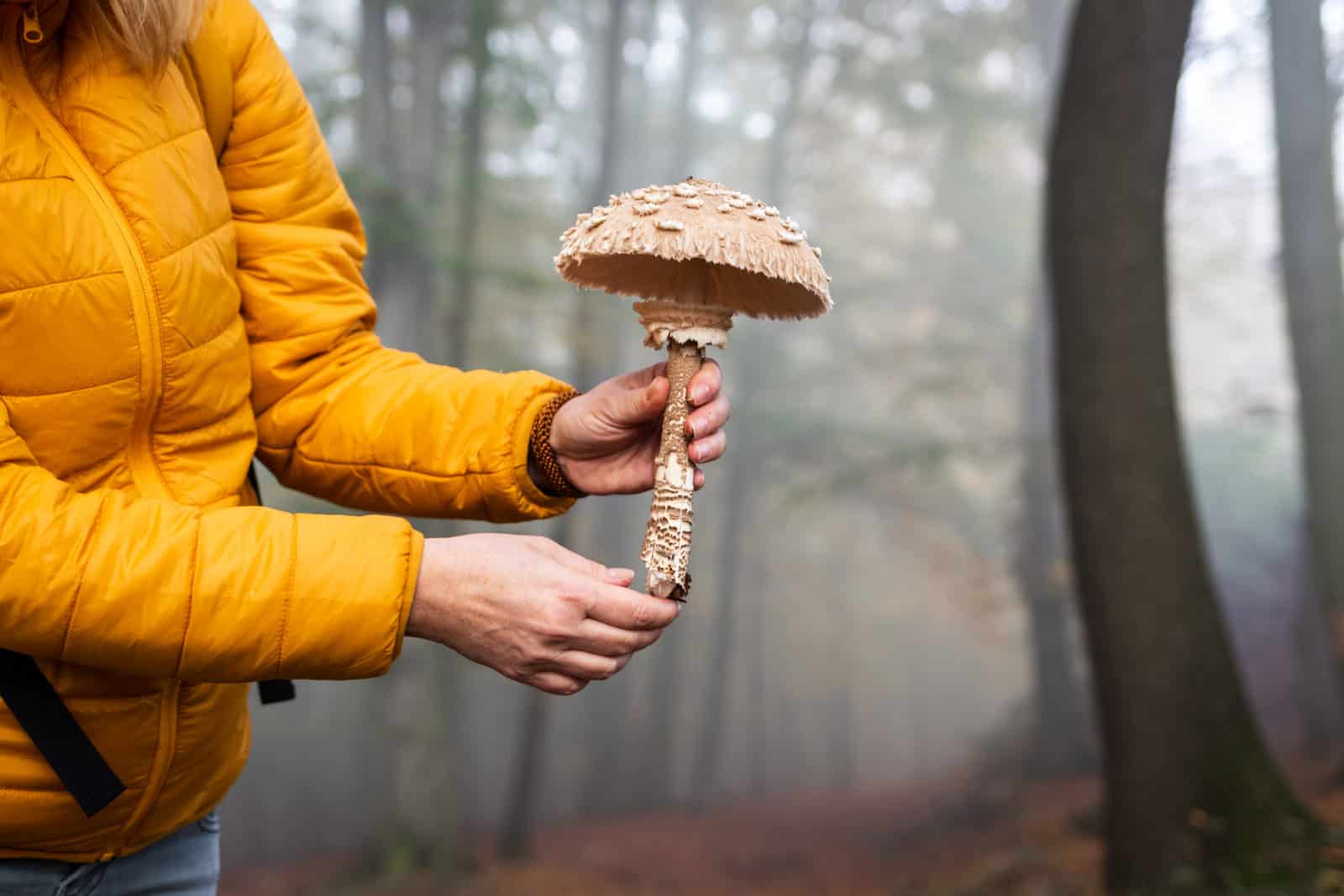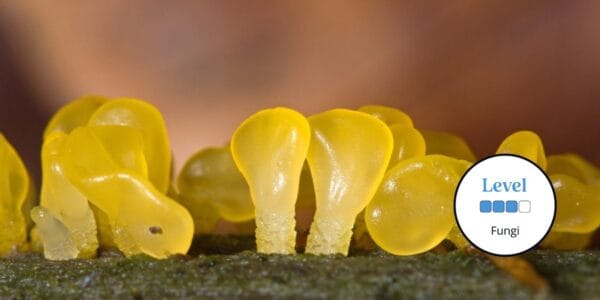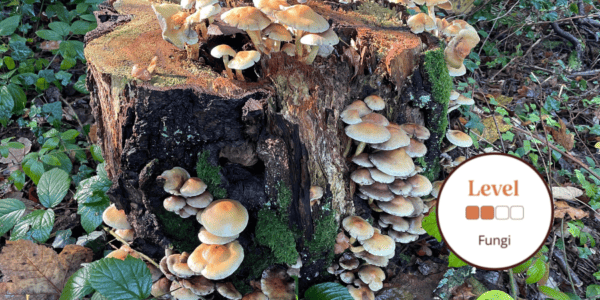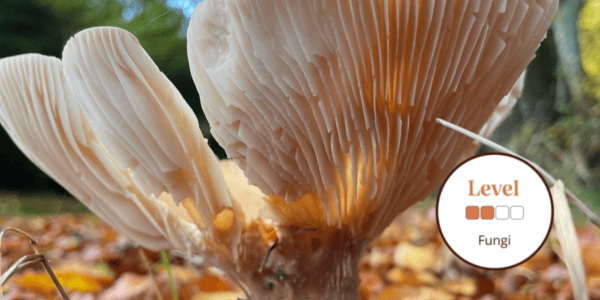This beginner fungi course is a starting guide to the skills and knowledge required to begin identifying UK fungi in the field.
Looking at habitat, substrate and how the fungus interacts with its surroundings is an important skill needed when observing fungi in the field.
This is the perfect course for beginners looking to learn more about the fungi around them and start to identify fungi groups. You will learn valuable observational field skills; what to look for, what to record and how to record it with the support of our expert tutor. The course will cover the variety of habitats in which you can find fungi, the diversity of fruiting bodies, and key features to look for, allowing you to fully immerse yourself in the weird and wonderful world of fungi.
Location: Dounans Centre, Aberfoyle, Stirling, Scotland, FK8 3UT
Dounans is set in the heart of Loch Lomond and the Trossachs National Park. The Centre has a wealth of natural resources on its doorstep and is perfect for education, exploration and adventure!
PLEASE NOTE the course fee is for tuition only. There are no accommodation, refreshment, or evening meal facilities available with this course
Bookings will close sooner if course capacity is reached
This course is suited for anyone looking to develop field observation skills when exploring fungi. This course is a perfect starter course to our Field Ecology of Woodland Fungi course happening the next day.
Who Should Attend?
Nature enthusiasts, Students, Rangers, Early career ecologists.
Knowledge Level
Beginner. Level descriptors can be found on the following webpage: Framework and Course Level Descriptors
Prior Knowledge
No existing knowledge, or experience is needed for this course. Just a willingness to explore and learn.
This course will cover:
-
- Morphological features for fungi
- Identification features and tips
- Making field notes
- Fungi habitat
- Field equipment
This is not a specific species identification course
By the end of the course, you will be able to:
-
- Understand key morphological features to begin a fungus identification
- Describe the variety of habitats in which you can find fungi and how this can be used to make an accurate identification
- Record useful field notes and use the correct equipment to safely collect fungi
- Share this knowledge with friends, family, and fellow volunteers
This is a place-based training course from the Field Studies Council, including a balance of classroom-led learning to impart important knowledge and irreplaceable hands-on outdoor learning opportunities to give individuals skills and confidence. After attending this course, you may like to progress your learning with further relevant courses or branch out into other areas of natural history. The Field Studies Council offers both online and in person courses, so you can choose the learning style that suits you best.
The course gives you the opportunity to immerse yourself in a new subject and acquire novel skills. Our fantastic tutor will combine the use of classroom-led learning and outside learning opportunities to give individuals the skills and confidence to progress their learning.
- See the ‘Example Timetable’ and ‘What’s Included’ sections below for more information about this course.
- Upon booking you will need to provide individual details of all attendees
- Please email [email protected] if you have any questions.
Group Bookings Made Easy
If you have a group of 10 or more individuals wanting to complete one of our courses, our team are available to discuss your options – from discounts to private team courses.
-
- Discounted rates
- Privately run courses for your group
- Bespoke courses developed specifically for your needs
If we are unable reach viable numbers for this course, we will inform you of the course cancellation 14 days prior to the course run. We would recommend when purchasing accommodation and/or travel you should take out your own insurance.
Tutor: Chris Knowles
Chris Knowles is both an ecologist and a consultant field mycologist, carrying out fungus surveys for a variety of clients. He is also an active member of his local fungus group and the recorder for Edinburgh & Lothians.Book with Confidence
We understand the difficulties of making plans in the current situation when guidelines continue to change, and insurance conditions are being tightened. In response, we will continue to offer additional flexibility. Find out more here
Example Timetable
Example Timetable
This timetable is subject to change but should give a clear outline of what to expect
- Please arrive in time for the course to start promptly at 10:00am
- The course will end at 5:00pm.
| 10:00am | Introductions |
| 10:15am | Classroom session covering:
|
| 11:00pm | Break - refreshments not provided |
| 11:15pm | Field session |
| 12:30pm | Lunch - not provided |
| 1:30pm | Classroom session covering:
|
| 2:00pm | Field session |
| 4:00pm | Classroom plenary and final question |
| 5:00pm | Finish |
Please note accommodation, refreshments and an evening meal are not included
What's Included
The course has been carefully created by expert tutors and educators to help you continue to build and develop your knowledge and apply it within the field surrounded by like-minded individuals.
The course includes:
- Classroom learning covering the theory of the species
- Field excursions to apply new knowledge
- Expert tuition for which the Field Studies Council is renowned
- Clear objectives and progression
You can rest assured that the absolute best content from an expert in environmental education will be provided. In choosing a Field Studies Council course, you will be joining thousands of people who learn with us each year.
Before You Attend
What to Bring
- Notebook and pencil
- Lunch and refreshments
- Sensible footwear and clothing for being outdoors
If you have them
- Hand lens
- Penknife
- Any up to date field guide to the fungi
There will be a member of staff with first aid training and access to a first aid kit on site. If you have special medical or access requirements, please let us know as soon as possible so we can plan the course.
Sorry this course has ended




